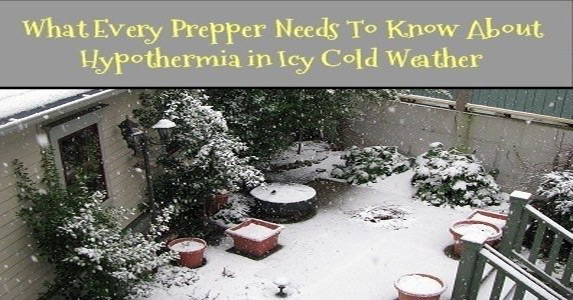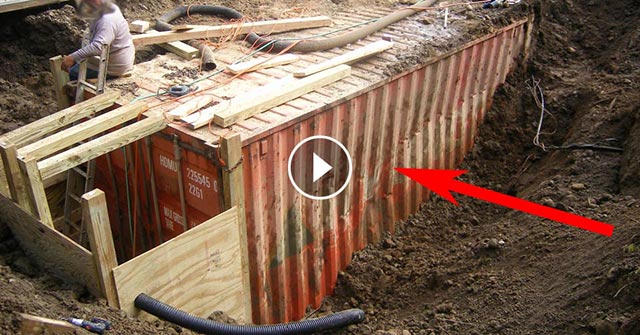Click Here To Join Our Telegram Channel for FREE daily tutorials!

Unless you live in the tropics, winter is likely to bring uncertain weather, including bone-chilling temperatures, severe winds, freezing rain and significant snowfall. Needless to say, such conditions are not much fun under the best of circumstances. If there is no power and no heat, the effects of winter are magnified, especially for those that have failed to prepare for extreme weather events.
Being prepared for winter weather conditions is not rocket science and there is much you can do to ensure the safety of your home and family during the winter storm season. Having an alternate heat source is a good start as is plenty of warm blankets and clothing. Even with these precautions. it is still likely that the cold will get to you, especially if you have to spend time outdoors clearing debris, shoveling snow, or simply walking your dog.
Hypothermia can be deadly so the more we know about it the better. Of course, educating yourself regarding the effects of extremely cold weather on the human body is an important step to take before the icy cold weather sets in. That said, it is never too late to become informed, even if you are currently in the midst of a snowstorm or blizzard.
Today it is my pleasure to share an article written by Joe Alton, M.D., who, with his wife Amy, share their extensive medical knowledge at their Doom and Bloom website. As licensed health care practitioners, when they have something to say about survival medicine, I listen.
I Live in a Warm Climate – Why Do I Need to Learn This Stuff?
If you think that hypothermia and cold weather preparedness is someone else’s problem, think again. I asked Joe the following question:
Gaye: I understand the dangers of hypothermia for those that live in colder climates. But what about everyone else? Why should they pay attention and be concerned as well?
Joe: Few people realize that they are in danger of becoming hypothermic anytime a large percentage of their body’s surface area comes in contact with temperatures lower than the body core. If you fell off a boat in the Bahamas into 82 degrees F water, you would eventually succumb to hypothermia if not rescued. You only have to drop to 95 degrees F to feel the effects of hypothermia.
Cold Weather Preparedness
It looks like another harsh winter, with ice storms and blizzards already carpeting much of the Midwest, Northeast, and Canada, and cold weather preparedness is a must for survival. Failure to use precautions will lead to a condition called hypothermia. Hypothermia is a condition where the core body temperature drops below 95 degrees Fahrenheit. The normal body core temperature is defined as between 97.5-99.5 degrees Fahrenheit (36.0-37.5 degrees Celsius).
In your efforts to be medically self-reliant, one of the major factors that must be taken into consideration is your environment. If you haven’t prepared for the weather, you have made your environment your enemy, and it is a formidable one. The last ice storm caused 27 deaths, some of which were avoidable. Therefore, it’s important to be prepared to prevent death from exposure and to know how to treat someone who is hypothermic.
How Your Body Loses Heat
Your body has various methods it uses to control its internal “core” temperature, either raising it or lowering it to appropriate levels. The body “core“ refers to the major internal organ systems that are necessary to maintain life, such as your brain, heart, liver, and others.
In cold weather, your blood vessels constrict to conserve heat. Muscles “shiver” as a method of heat production. You can voluntarily increase the heat by exertion; it is recommended to “keep moving” in cold environments for this reason. Part of the healthcare provider’s role is to educate each and every member of their family or group on proper planning for outdoor activities. Monitor weather conditions as well as the people you’re sending out in the heat or cold.

The body loses heat in various ways:
Evaporation – the body perspires (sweats), which releases heat from the core.
Radiation – the body loses heat to the environment anytime that the ambient (surrounding) temperature is below the core temperature (say, 98.6 degrees Fahrenheit). For example, you lose more heat if exposed to an outside temperature of 20 degrees F than if exposed to 80 degrees F.
Conduction – The body loses heat when its surface is in direct contact with cold temperatures, as in the case of someone falling from a boat into the frigid water. Water, being denser than air, removes heat from the body much faster.
Convection – Heat loss where, for instance, a cooler object is in motion against the body core. The air next to the skin is heated and then removed, which requires the body to use energy to re-heat. Wind Chill is one example of air convection: If the ambient temperature is 32 degrees F but the wind chill factor is at 5 degrees F, you lose heat from your body as if it were actually 5 degrees F.
Most heat is lost from the head area, due to its large surface area and tendency to be uncovered. Direct contact with anything cold, especially over a large area of your body, will cause rapid cooling of your body core temperature. The classic example of this would be a fall into cold water. In the Titanic sinking of 1912, hundreds of people fell into the near-freezing water. Within 15 minutes, they were probably beyond medical help.
Physical Effects of Hypothermia
Aside from shivering, the most noticeable symptoms of hypothermia will be related to mental status. The person may appear confused, uncoordinated, and lethargic. As the condition worsens, speech may become slurred; the patient will appear apathetic and uninterested in helping themselves or may fall asleep. This occurs due to the effect of cooling temperatures on the brain; the colder the body core gets, the slower the brain works. Brain function is supposed to cease at about 68 degrees Fahrenheit, although I have read of exceptional cases in which people (usually children) have survived even lower temperatures.
To prevent hypothermia, you must anticipate the climate that you will be traveling through, including wind conditions and wet weather. Condition yourself physically to be fit for the challenge. Travel with a partner if at all possible, and have enough food and water available for the entire trip.
Prevention Strategies for Hypothermia
In your efforts to be medically self-reliant, one of the major factors that must be taken into consideration is your environment. If you haven’t prepared for the weather, you have made your environment your enemy, and it is a formidable one.
Remember the simple acronym C.O.L.D. This stands for Cover, Overexertion, Layering, and Dry:
Cover. Protect your head by wearing a hat. This will prevent body heat from escaping from your head. Instead of using gloves to cover your hands, use mittens. Mittens are more helpful than gloves because they keep your fingers in contact with one another. This conserves heat.
Overexertion. Avoid activities that cause you to sweat a lot. Cold weather causes you to lose body heat quickly, and wet, sweaty clothing accelerates the process. Rest when necessary; use rest periods to self-assess for cold-related changes. Pay careful attention to the status of your elderly or juvenile group members.
Layering. Loose-fitting, lightweight clothing in layers insulate you well. Use clothing made of tightly woven, water-repellent material for protection against the wind. Wool or silk inner layers hold body heat better than cotton does. Some synthetic materials work well, also. Especially cover the head, neck, hands, and feet.
Dry. Keep as dry as you can. Get out of wet clothing as soon as possible. It’s very easy for snow to get into gloves and boots, so pay particular attention to your hands and feet.
Any unconscious person that you encounter in a cold environment is hypothermic until proven otherwise. Immediate action must be taken to reverse the ill effects.
Treatment of Hypothermia
A person who is hypothermic is in danger of losing their life without your help. Important measures to take are:
Get the person out of the cold and into a warm, dry location. If you’re unable to move the person out of the cold, shield him or her from the cold and wind as much as possible.
1. Take off wet clothing. If the person is wearing wet clothing, remove them gently. Cover them with layers of dry blankets, including the head (leave the face clear). If you are outside, cover the ground to eliminate exposure to the cold surface.
2. Monitor breathing. A person with severe hypothermia may be unconscious. Verify that the patient is breathing and check for a pulse. Begin CPR if necessary.
3. Share body heat. To warm the person’s body, remove your clothing and lie next to the person, making skin-to-skin contact. Then cover both of your bodies with blankets. Some people may cringe at this notion, but it’s important to remember that you are trying to save a life. Gentle massage or rubbing may be helpful, but vigorous movements may traumatize the patient.
4. Give warm oral fluids. If the affected person is alert and able to swallow, provide a warm, non-alcoholic, non-caffeinated beverage to help warm the body. Remember, alcohol does not warm you up!

Use warm, dry compresses. Use a first-aid warm compress (a fluid-filled bag that warms up when squeezed), or a makeshift compress of warm (not hot) water in a plastic bottle. Apply a compress only to the neck, chest wall or groin. These areas will spread the heat much better than putting warm compresses on the extremities, which sometimes worsens the condition.
Avoid applying direct heat. Don’t use hot water, a heating pad or a heating lamp to warm the person. The extreme heat can damage the skin, cause strain on the heart or even lead to cardiac arrest. Don’t rub on extremities that may be frostbitten, as the skin is already traumatized and the condition may be worsened.
Don’t give alcohol. You have all seen photos of St. Bernard’s with casks of brandy around their necks for lost alpine travelers. Alcohol may give you a warm and fuzzy feeling, but it also expands blood vessels, which causes heat loss!
 No Alcohol for Hypothermia! Bad Dog!
No Alcohol for Hypothermia! Bad Dog!
If left untreated, hypothermia leads to complete failure of various organ systems and to death. Make sure your people are well clothed for the temperature, and monitor them closely if they are outside for extended periods of time in cold weather.
Joe and Amy Alton are the authors of the #1 Amazon Bestseller “The Survival Medicine Handbook“. For over 400 articles on medical preparedness, go to their website at www.doomandbloom.net. You may follow them on Twitter, Facebook, YouTube, and the Survival Medicine Hour Podcast.
The Final Word
Bug out strategies, survival gear, emergency food storage and water purification are the bread and butter staples of prepper-oriented websites. But being prepared involves so much more. Sometimes we have to move beyond the fluff and the easy stuff. We need to stay educated about the hazards of daily life; hazards that will be magnified 100-fold following a disaster or other emergency.
I would like to thank Joe and Amy for allowing me to share their article and especially for the outlining strategies to treat a suspected case of hypothermia. Having this knowledge could save a life.
Be well and be safe everyone.
By Gaye Levy
This Crazy Off Grid Device Literally Makes Drinkable Water From Fresh Air:
According to NASA, the U.S. is expecting a 100-YEAR LONG MEGADROUGHT.
It's already begun. Ask the farmers in California. They know.
Every survivalist knows that water is of critical importance. You NEED an independent water source that you can count on!
As an interesting "survival rehearsal" - imagine that you turned the tap on right now and nothing came out. How long would you last?
But what if there was another water source literally hidden in plain sight. That's right, I'm talking about the atmosphere!
The amazing thing about getting water from the natural moisture in the air... is that it is ALWAYS available.
This gives you real water security!
Learn more about how to tap into "Nature's secret water reservoir" and stay hydrated when TSHTF!
Watch the video:
😳 What Tinnitus Does To Your Brain Cells (And How To Stop It)
After 47 years of studies and countless brain scans done on more than 2,400 tinnitus patients, scientists at the MIT Institute found that in a shocking 96% of cases, tinnitus was actually shrinking their brain cells.
As it turns out, tinnitus and brain health are strongly linked.
Even more interesting: The reason why top army officials are not deaf after decades of hearing machine guns, bombs going off and helicopter noises…
Is because they are using something called "the wire method", a simple protocol inspired by a classified surgery on deaf people from the 1950s...

I Can't Help Showing This Off:
If you haven't heard of Claude Davis yet do yourself a huge favor and watch this video.
One of the smartest guys I ever had the pleasure of meeting, Claude set-up a unique prepping system that changed his life forever.
I already tried it myself and let me tell... you I was completely blown away... His surprising tactics could make your life easier and give you the peace of mind you deserve.
Don't just take my word for it... watch his short video and decide for yourself.

Most People Don't Have The Guts To Try This:
An amazing discovery in an abandoned house in Austin, Texas: A lost book of amazing survival knowledge, believed to have been long vanished to history, has been found in a dusty drawer in the house which belonged to a guy named Claude Davis.
Remember... back in those days, there was no electricity... no refrigerators... no law enforcement... and certainly no grocery store or supermarkets... Some of these exceptional skills are hundreds of years of old and they were learned the hard way by the early pioneers.
>> Click here to find out about them now
We've lost to history so much survival knowledge that we've become clueless compared to what our great grandfathers did or built on a daily basis to sustain their families.
Neighbors said that for the last couple of years Claude has tried to unearth and learn the forgotten ways of our great-grandparents and claimed to have found a secret of gargantuan proportions. A secret that he is about to reveal together with 3 old teachings that will change everything you think you know about preparedness:
>>> Click Here To Watch His Short Video <<<

More Off-Grid And Survival Resources:

What REALLY Happens When You Bury a Shipping Container? (Hint: It's A Bit Crazy...)
Shipping containers are all the rage - but if you are thinking about buying one, you MUST watch this video first:
There's a general belief that if you bury a shipping container you can create an awesome root cellar / storm shelter / survival bunker.
But is a shipping container strong enough to handle the pressure?
Watch the video to see what happens:
What Really Happens When You Bury a Shipping Container? (Click To Watch Video)









Sadly this reflects zero wilderness knowledge or experience. Let’s discuss high energy foods when the patient shivers since the body is burning 7 times normal metabolic rate. If those energy stores deplete it’s a losing battle. Second, never share body heat. You now have 2 hypothermic patients. Use a rescue dog for body heat. What about acetaminophen and how is has negative effect on the hypothalamus which is the persons thermostat control.
This article like many others including the “ultimate” first aid kit will KILL folks. Oh yeah, I am an EMT, wilderness EMT , nurse and work with tactical medicine.
I am greatly concerned with this content.